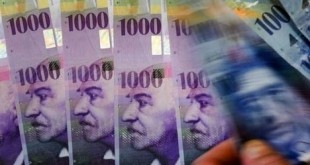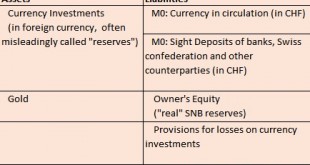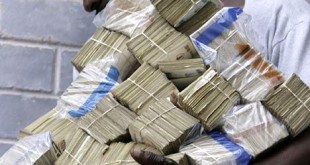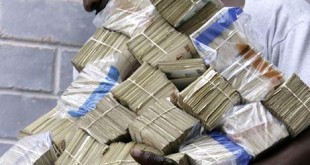As we predicted over a year ago, in a world in which QE has failed, and in which the ice-cold grip of NIRP has to be global in order to achieve its intended purpose of forcing savers around the world to spend the taxed product of their labor, one thing has to be abolished: cash. This explains the recent flurry of articles in outlets such as BBG and the FT, and op-eds by such "established" economists as Larry Summers, all advocating the death of cash, a process which would begin by...
Read More »Swiss Politicians Slam Attempts To Eliminate Cash, Compare Paper Money To A Gun Defending Freedom
As we predicted over a year ago, in a world in which QE has failed, and in which the ice-cold grip of NIRP has to be global in order to achieve its intended purpose of forcing savers around the world to spend the taxed product of their labor, one thing has to be abolished: cash. This explains the recent flurry of articles in outlets such as BBG and the FT, and op-eds by such "established" economists as Larry Summers, all advocating the death of cash, a process which would begin by...
Read More »The stock market’s siamese twin oiled Friday’s rally
Dear Investors! Because the stock market is currently strongly correlated to the energy sector, Friday’s rally responded in kind on the news of a surge of 12.3% in the NYMEX WTI sweet crude market after a report had suggested that OPEC may finally agree to cut its production to reduce the world glut. The news instantly oiled the S&P 500’s rise of 1.95%. However despite the strong daily gain, oil prices still ended the week down in spite of being the best one-day gain since February...
Read More »The stock market’s siamese twin oiled Friday’s rally
Dear Investors! Because the stock market is currently strongly correlated to the energy sector, Friday’s rally responded in kind on the news of a surge of 12.3% in the NYMEX WTI sweet crude market after a report had suggested that OPEC may finally agree to cut its production to reduce the world glut. The news instantly oiled the S&P 500’s rise of 1.95%. However despite the strong daily gain, oil prices still ended the week down in spite of being the best one-day gain since February...
Read More »Weekly SNB Intervention Update: Sight Deposits and Speculative Position
Headlines Second week of February: Speculative position: As expected rise to 7268 x 125k contracts long USD, short CHF.Sight Deposits: SNB intervenes for 0.9 bln. CHF during the bad market conditions; safe haven inflows were directed towards CHF or Swiss did not cover their trade surplus with the purchase of foreign assets.FX: EUR/CHF fell under 1.10 and EUR/USD over 1.12. Background Sight deposits are currently the by far most important means of financing for SNB currency purchases, for...
Read More »The Silver Blaze Report, 14 Feb, 2016
Again, we had another big drop in the dollar this week. No, we don’t mean against the dollar derivatives known as the euro, pound, etc. We mean by the only standard capable of measuring it: gold. The dollar fell 1.4 milligrams, to 25.1mg gold. Or, if you prefer, 0.1 grams of silver. For some reason, it’s obvious when the price of gold in Zimbabwe goes up from Z$118,000,000 to Z$123,700,000 that Zimbabweans are not getting rich. But when the price of gold rises from US $1,118 to $1,237, as...
Read More »The Silver Blaze Report, 14 Feb, 2016
Again, we had another big drop in the dollar this week. No, we don’t mean against the dollar derivatives known as the euro, pound, etc. We mean by the only standard capable of measuring it: gold. The dollar fell 1.4 milligrams, to 25.1mg gold. Or, if you prefer, 0.1 grams of silver. For some reason, it’s obvious when the price of gold in Zimbabwe goes up from Z$118,000,000 to Z$123,700,000 that Zimbabweans are not getting rich. But when the price of gold rises from US $1,118 to $1,237, as...
Read More »The World is not Ending (Yet), Panic To Subside
Investors have become unhinged. The increased volatility and dramatic market moves challenge even the most robust investment strategies. This sets off a chain reaction of money and risk management that further amplifies the price action, like an echo chamber. Then a cottage industry of reporters, analysts and bloggers offer explanations often without distinguishing the initial sound from the echo. At the same time, that which we have come to think of as terra firma has turned into...
Read More »Speculators Continue to Press
There are two broad developments in speculative positioning in the Commitment of Traders report in the week ending February 9. First, the market turbulence saw speculators reduce exposure. Of the 16 gross positions we track, 11 were reducing positions by liquidating longs or covering shorts. Second, there were an unusual amount of significant gross position adjustments, by which we mean a change of 10k contracts of more in a gross position. There were six such adjustments, and they...
Read More »Market Chaos Subsiding? Dollar Correction Over?
The outlook for the dollar in the week ahead is not about economic data or the FOMC and ECB minutes. It is about the stability of the global capital markets. Many are looking for an event or official action that will stop the rout that is of historic proportions to start the year. We too have been thinking about what it would take to stop the rot. However, none of the frequently mentioned events, like an agreement to cut oil output, or for a coordinated policy response by the major...
Read More » Swiss Economicblogs.org
Swiss Economicblogs.org








